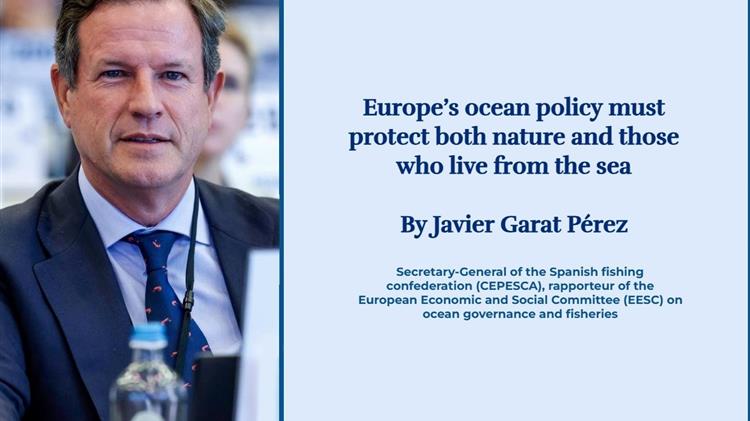Agro World News: Javier Garat Pérez: Civil society demands a fairer european ocean policy

Civil society is calling on the European Union to put people—not just policies—at the center of its new Ocean Pact. In a newly adopted opinion, the European Economic and Social Committee (EESC) urges the development of maritime strategies that protect biodiversity without sacrificing fairness for coastal communities or the competitiveness of the maritime economy. It also emphasizes the need for the Pact to align with broader EU objectives such as the Green Deal, the Sustainable Development Goals (SDGs), and the Blue Economy Strategy, while ensuring coherence across related EU policy frameworks.
The EESC’s message is clearly laid out in its opinion on the EU’s ratification of the High Seas Treaty (BBNJ Agreement), officially titled Conservation and sustainable use of marine biological diversity of areas beyond national jurisdiction. Adopted on 16 July 2025 and drafted by rapporteur Javier Garat Pérez, the opinion supports the Commission’s proposal to incorporate the treaty into EU law, but warns that implementation must be coherent, coordinated, and socially just.
The EESC supports the Commission’s call for strict transposition of the BBNJ agreement into the EU legal framework, ensuring legal certainty and a level playing field for all stakeholders. It underscores the need for compatibility with existing sectoral policies—from maritime transport to fisheries and environmental legislation. The opinion goes further by calling for alignment with other multilateral environmental agreements and by advocating for genuine inter-institutional cooperation among DG ENV, DG MARE, and DG MOVE. As Garat Pérez states, “The High Seas Treaty must not become a blunt tool. Conservation must go hand in hand with economic, social and cultural sustainability.”
The EESC also backs the EU’s commitment to the 30×30 target—protecting 30% of global oceans by 2030, as outlined in the Kunming-Montreal Global Biodiversity Framework. But it warns that marine protected areas in the high seas must be ecologically meaningful, equitably governed, socially inclusive, and adapted to regional contexts.
The opinion highlights the experience of Regional Fisheries Management Organizations (RFMOs), many of which already manage protected zones and are developing new tools such as Other Effective Area-Based Conservation Measures (OECMs). The EESC urges the Commission to build on existing knowledge without undermining the mandates of these organizations.
During the same plenary session, the EESC adopted a second opinion—also drafted by Garat Pérez—on the transposition of RFMO measures into EU law. This second opinion stresses the urgency of simplifying and accelerating the process, warning that the current system is too slow and bureaucratic. It calls for a fast-track mechanism to ensure that technical conservation measures can be implemented swiftly when needed, while stressing that transposition must not impose additional obligations on the EU fleet or jeopardize its competitiveness relative to third-country operators.
“Setting targets is not enough. We must ensure they are implemented with scientific support, local knowledge, and real backing for the people on the frontlines,” noted Pérez. The EESC stresses that the designation of new conservation zones must take into account regional specificities, socioeconomic impacts, and the need to preserve both food production and viable small- and large-scale fisheries.
While acknowledging the EU’s progress, the EESC calls for greater ambition. A formal EU Action Plan could fill the remaining gaps in policy—ranging from a “sea farm to fork” strategy and tidal energy priorities to inclusive governance and long-term scientific monitoring.
“The Ocean Pact gave us direction; these new opinions give us the tools to move forward,” said Garat Pérez.
The EESC welcomes the EU’s leadership in ocean diplomacy, but stresses that the success of the Treaty will be judged not by targets alone, but by how effectively they are implemented with fairness and trust. It warns that conservation efforts without the involvement of local communities risk alienating the very people whose cooperation is most vital. That is why the Committee calls for stronger governance based on subsidiarity and institutionalized civil society engagement.
“This is about trust. If Europe asks coastal communities to protect the oceans, it must also ensure they get a fair share of the benefits,” concluded Javier Garat Pérez.
Ακολουθήστε το Agrocapital.gr στο Google News και μάθετε πρώτοι τις ειδήσεις
Οι απόψεις που εκφράζονται στα σχόλια των άρθρων δεν απηχούν κατ’ ανάγκη τις απόψεις της ιστοσελίδας μας, το οποίο ως εκ τούτου δεν φέρει καμία ευθύνη. Για τα άρθρα που αναδημοσιεύονται εδώ με πηγή, ουδεμία ευθύνη εκ του νόμου φέρουμε καθώς απηχούν αποκλειστικά τις απόψεις των συντακτών τους και δεν δεσμεύουν καθ’ οιονδήποτε τρόπο την ιστοσελίδα.




